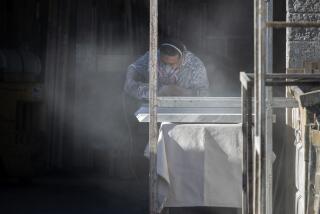Senate Panel to Probe Efficiency of Cal/OSHA : Safety: Hearings are called after reports of the agency’s failure to protect Latinos and other factory workers.
- Share via
The state Senate’s Industrial Relations Committee will conduct special hearings to investigate a report that California’s occupational safety and health agency (Cal/OSHA) has failed to adequately protect Latinos working in local factories, the committee’s chairman said Tuesday.
State Sen. Patrick Johnston (D-Stockton) said he intends to schedule a series of interim hearings as early as October to examine whether Cal/OSHA has fulfilled its mandate of ensuring the safety and health of Latinos, as well as all workers in California.
The scope of the hearings will be statewide, Johnston said, though the focus will initially be on the industrial Los Angeles Basin.
Johnston’s call for investigative hearings follows a Times series that found that Cal/OSHA rarely inspects factories that rely heavily on Latino laborers. The series also found that Latinos suffer disproportionately high rates of death and injury on the job, and that proportionately far fewer Cal/OSHA inspectors are based in heavily Latino Southern California than in other areas of the state.
“A performance audit of Cal/OSHA is long overdue,” Johnston said. “(The Times has) provided more than enough information to suggest that the law is not being complied with.”
Johnston’s Senate Industrial Relations Committee oversees Cal/OSHA. His call for a review of the 20-year-old agency came at the urging of state Sen. Art Torres (D-Los Angeles), whose district includes many factories and assembly plants that rely primarily on Latino laborers.
Torres said he believes that Cal/OSHA may be guilty, at the very least, of benign neglect in cases in which Latinos were accidentally killed or injured in factories that had not been inspected by agency officials.
“We’ve had suspicions that this was the case,” Torres said. “It’s tragic to see what could’ve been prevented.”
Two other Democratic state legislators from Los Angeles--Assemblyman Richard Polanco and Sen. Charles M. Calderon--also joined the call for hearings.
“While politicians and many Californians continue to bash immigrants by suggesting that they are . . . lazy welfare cheaters or job thieves, the reality is that immigrants come to work, taking the difficult, low-paying jobs that no one wants,” Calderon said. “Now it seems that many Latino workers have become factory fodder for California’s economy. Instead of berating these workers, we should be expending our energy to force employers to meet safety and wage standards.”
Polanco described Cal/OSHA as “an agency that has good intentions but, under the last eight years of administration, has not had a real commitment to make it work.”
Although most California manufacturing is located in and around Los Angeles, the region has proportionately far fewer Cal/OSHA inspectors than the agency’s other three administrative areas. There are 42 inspectors and industrial hygienists for an area that includes all of Los Angeles and Ventura counties--one inspector for every 490 manufacturing facilities.
Last year, about 4% of all factories in Cal/OSHA’s Los Angeles administrative region were inspected, compared to 10% in the agency’s San Francisco region and 16% in its Sacramento region, records show. In the region encompassing San Diego and most of Orange counties, about 5% were inspected.
Moreover, few Cal/OSHA inspectors based in the heavily Latino Los Angeles area speak Spanish and must sometimes rely on the companies they are investigating to provide translators after a worker’s injury or death, The Times found.
Cal/OSHA administrators defend the agency, saying that it has been hamstrung by hiring freezes and budget constraints. Even with unlimited resources, they say, Cal/OSHA could never guarantee the safety of all who work in manufacturing.
Manufacturers’ lobbying groups in California have argued that if anything, Cal/OSHA has been too tough in its enforcement of health and safety regulations, prompting thousands of businesses to flee the state. Heeding those concerns, California legislators have eased regulations in some instances.
Johnston said that witnesses will probably be subpoenaed to appear for the Cal/OSHA hearings that he intends to hold, and that committee investigators may accompany safety inspectors into the field to determine how well they are doing their jobs.
The end result, Johnston said, could be a bolstering of Cal/OSHA’s budget. “If the Legislature doesn’t get the support of the governor,” he said, “this ought to be an issue in the election” next year.
More to Read
Get the L.A. Times Politics newsletter
Deeply reported insights into legislation, politics and policy from Sacramento, Washington and beyond. In your inbox twice per week.
You may occasionally receive promotional content from the Los Angeles Times.










